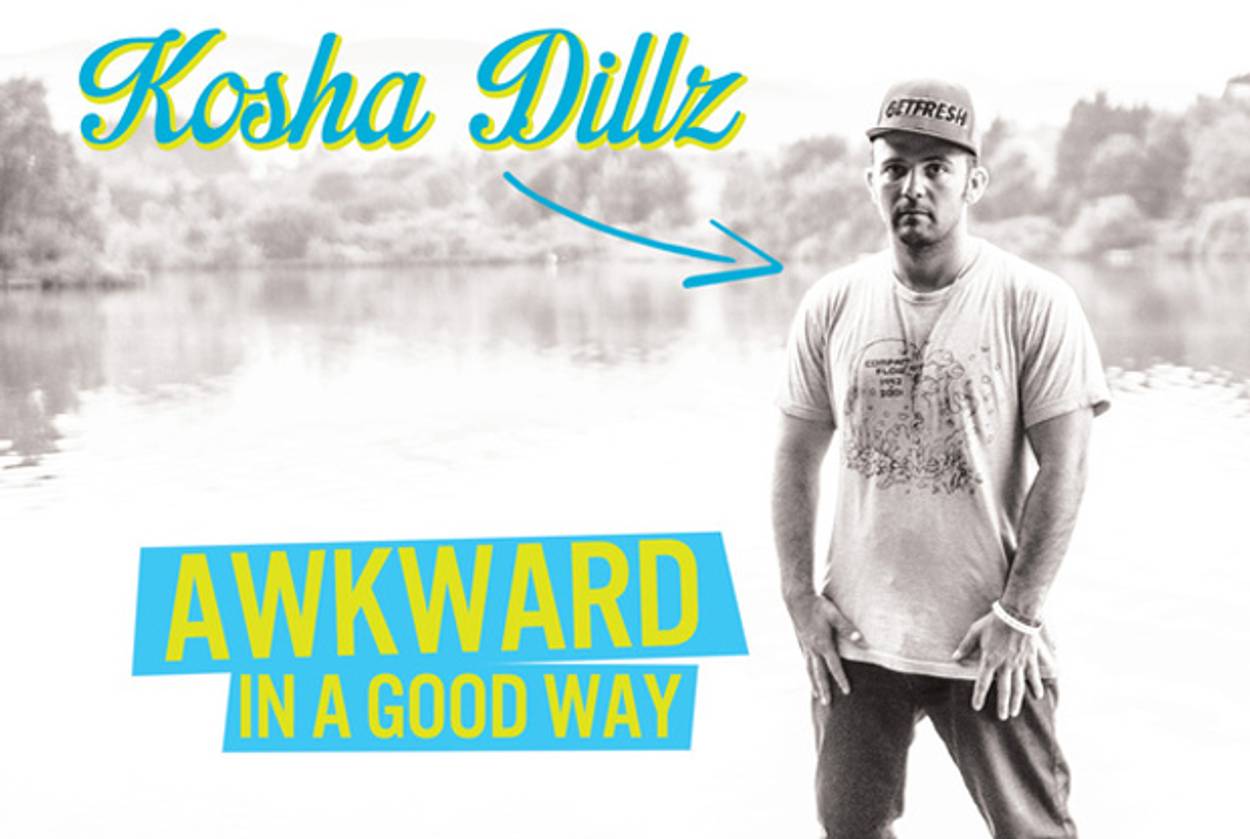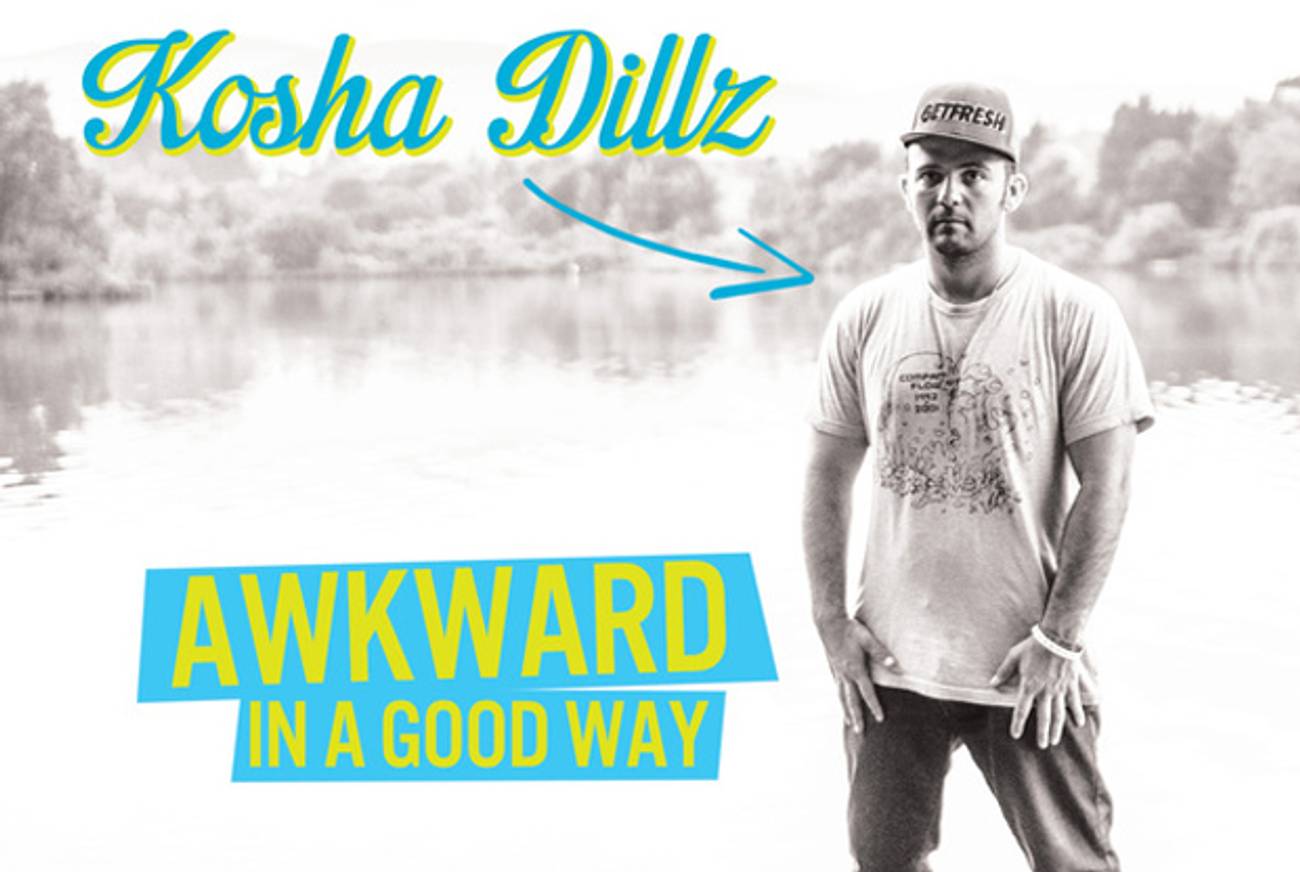Kosha Dillz Embraces His Awkward Side
The rapper gets personal with his new album, ‘Awkward in a Good Way’




About an hour before performing at the release concert for his album Awkward in a Good Way last Monday night, Kosha Dillz works the crowd, weaving his way through fans, friends, and unsuspecting concertgoers to dole out hugs, introduce people, and listen to the opening acts. When Dillz meets me at the door to the studio at Webster Hall, Matisyahu is on stage beatboxing as Stan Ipcus raps alongside him. They are both white and Jewish. This is not your typical rap show.
“I’m a Jewish rapper and I don’t give a fuck.” Kosha Dillz told me when we met earlier that day. “I feel perfectly in place being out of place. That’s kind of my strength,” Dillz, born Rami Matan Even-Esh, picked me up and drove to the first place he ever rapped in front of a crowd, Nuyorican Poets Café. “It’ll be a totally nostalgic moment,” he said, excited. At 16, before the album release shows, red carpets with RZA, freestyles with A$AP Rocky in France, and Pepsi Superbowl commercials, Dillz started rapping—ironically enough—to fit in in his hometown of Edison, New Jersey. “All my homies were doing it,” he explained. “We would just get high and rap.”
Dillz chose his rap name from a pickle jar. “I was like, I’m going to be who I am and represent my identity. I was always very proud of being Jewish.” His parents were Israeli, and though Dillz didn’t grow up religious, redefining the Jewish stereotype as badass was part of his agenda.
Soon Dillz and his friends started taking rap more seriously. They would drive into New York City from New Jersey to participate in freestyle battles like Bragging Rights at Nuyorican. “I would call it the 8 Mile of New York,” he says as an Eminem song played on the radio in the background. “I remember the first time they called up ‘Kosher Dill Pickle!’ That was my first experience of someone saying that. I didn’t make it past the first round, but the next time I did. I was like, ‘Alright, now I’m legit.’” Dillz kept writing, freestyling, and battling, and by the time he started college at Rutgers University, he was known for his rapping.
“I was taking second place and third place and never winning,” he told me. “I had a big issue with failure and success.” After freshman year, life quickly changed. “I started getting arrested and going to jail,” he explained. He was selling and using drugs—everything from ecstasy to cocaine and marijuana—and was at times under watch by federal marshals. “I took it from doing a little coke to selling a lot of drugs,” he said. “I would buy a bag of weed and be like, ‘Let’s just sell pounds of weed.’ That’s just how my mind operated.” Dillz doesn’t remember much that happened between the ages of 19 and 21, but since he was too disoriented to write anything down, he worked on his freestyling. “I would be up all night high on coke and then rhyming at 7 a.m. on some street corner in the projects.”
Three jail stints later, Dillz was ready to get clean. Promoting himself and networking nonstop become a new drug: “There’s always more flyers to pass out, more this to pass out. I want to sell my album in Times Square like an idiot,” he said.
In 2004 a friend introduced him to Matisyahu. “He was like, ‘Yo, let’s study.’ That was my first religious experience,” Dillz says. “Then when I came over he kicked a beatbox and I rhymed. That’s kind of how I learned about performing.” He hustled, went to every show, met with anyone who would talk to him.
“He does not have stop in him. Every show you’re in, all over the country and all over the world, you turn around and Kosha Dillz is there,” said Peter Rosenberg, the Hot 97 DJ hosting the release party. “I’ve always been impressed by that.”
Dillz met RZA, one of the founding members of the Wu-Tang Clan and a major force in bringing hip-hop to the mainstream masses, backstage at a show and opened for him that night. He also met Murs on tour, although the underground rap fixture didn’t vibe with Dillz’s self-proclaimed “social awkwardness and anxiety.” Sticking with it, though, Dillz kept showing up and eventually Murs signed him to his #MURS316 label. “The fact that I’m here, that just takes years and years of being annoying and showing up and just not caring what other people think,” Dillz explained.
Now he’s released Awkward in a Good Way, his first album on Murs’ label. It’s an insightful, up-close look at Dillz, now 32, finding himself and embracing his place as an outcast. “I’m starting to make songs that people can identify with,” he explained. He went off his anti-depressants when he started writing the album, he told me, in an effort to open himself up to darker thoughts and engage his psyche. “I used to be like, ‘Let’s make a song that no one wants to hear.’ Now it’s about being yourself and embracing the fact that you’re not like everyone else. I’m definitely not like everyone else.”
Back at Webster Hall, Dillz walks on stage to loud chants of “Kosha, Kosha, Kosha.” The crowd embraces him. Dillz looses himself in the show, bringing out tap dancers, freestyling about random objects audience members bring on stage, and eventually walking straight into the crowd and rapping among his fans.
When he’s done performing, Dillz walks off the stage and straight to the merchandise table, where he hawks copies of his album along with T-shirts that read “Everything is Kosha.” Even now, he’s still hustling.
Related: Hot 97’s Morning Jew
King Without a Beard: The Rise and Fall and Rise of a Former Reggae Star
Finding the Beat
Previous:
Lauren Schwartzberg is an intern at Tablet Magazine.